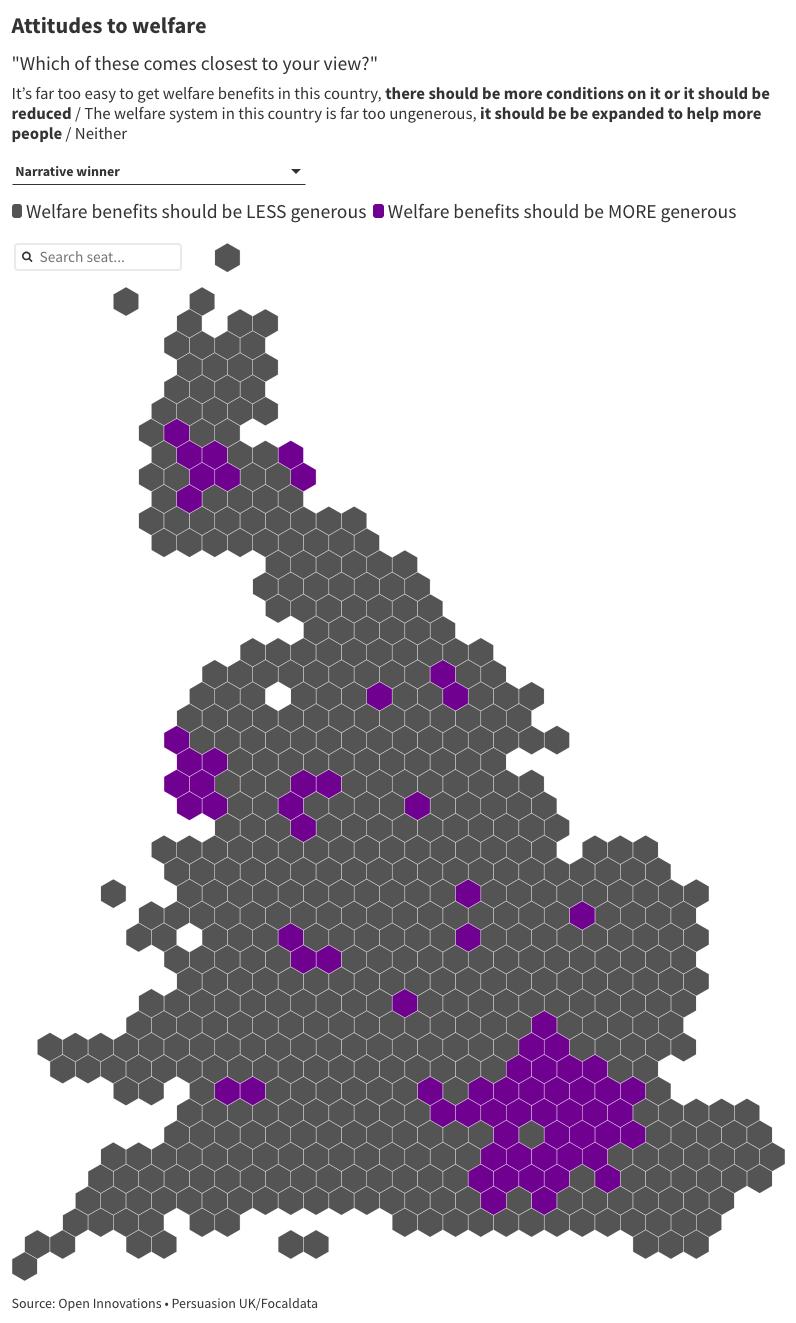




July 15th 2024
● IPPR (Institute of Public Policy Research) is an independent charity working towards a fairer, greener and more prosperous society.
● Persuasion UK is a new research initiative set up to study what is shaping public opinion on the issues that define British politics.
● IPPR and Persuasion are separate organisations but have a strategic partnership, meaning they work together on projects of shared interest.

● Get a ‘baseline’ of opinion for issues likely to dominate this Parliament.
● Map this opinion across every constituency.
● Analyse opinion across the constituency coalition of the Labour government, in particular.

● 20,000 person polling survey in the week of 1st July 2024. Fieldwork conducted by FocalData.
● Multilevel Regression with Poststratification (MRP) technique to map opinion across every constituency
● 10 interactive opinion maps created as a result of this, which it’s possible to see individual seat results - and filter for seats that changed hands at the general election.
● We can also use this ‘mega poll’ to analyse the opinions of key switcher groups within the electorate.

● Overall the new Labour government’s electoral coalition is united on some issues and divided on others. Broadly, we can see that it is united on issues of economic change and less united on questions of culture and identity.
● On the upside, the government has clear permission structure in the following areas:
○ Borrowing to invest. 99% of constituencies Labour won at the election have a majority or plurality of people who would support extra government borrowing to invest in the economy and public services. Conservative to Labour switchers also back this idea by a large margin.
○ Housebuilding and infrastructure. While of course small pockets of local opposition can always cause problems, levels of ‘NIMBYism’ is low in Labour constituencies - and especially low for onshore wind farms.
○ Net Zero. The view that the government should be going faster on climate change policy rather than slower is held by all constituencies Labour hold - and in all but two constituencies nationally (Clacton and Boston, both held by Reform). This does not equate to a ‘blank cheque’ - there will be tricky green policy debates to navigate in this Parliament - but it does suggest levels of backlash to Net Zero remain very low.
○ Every UK constituency has a majority or plurality of voters backing the strengthening of workers rights.

○ 84% of Labour held constituencies - and 74% of seats Labour gained at the election - back closer
● On the downside, there is less consensus on the following issues within Labour’s electoral coalition:
○ Issues of culture and identity are particularly challenging for Labour electorally.
■ On immigration, only 22% of Labour constituencies have more people thinking that ‘immigration has enriched society’ than ‘immigration has undermined society’. We see a large spread of opinion in Labour’s coalition on this, with many Labour seats having very proimmigration opinions and many much less so.
■ Likewise, on discrimination, only 27% of Labour held seats back the idea that non-white people face more discrimination than white. Again, we see a large spread of opinion among Labour seats on this matter.
■ It should be noted that opinion on issues as complex as these is dynamic and will always be hard to capture in one or two questions. Labour voters overall remain progressive on these questions, but it is also true that the government now represents a large number of more socially conservative constituencies.
○ Welfare. Voters overall, and most of the seats Labour hold, retain somewhat welfare sceptic viewswith a majority of Labour constituencies backing the view that welfare has become too generous.
● Tax. 33% of constituencies have a plurality or majority of people saying they would pay more tax to fund public services, with 77% of seats holding the contrary view - although it’s very close in a lot of constituencies. These numbers are less drastic when you look across the population - a small majority of Labour voters (55 percent) and Conservative Labour switchers (51 percent) would pay more tax if the money was invested in public services.

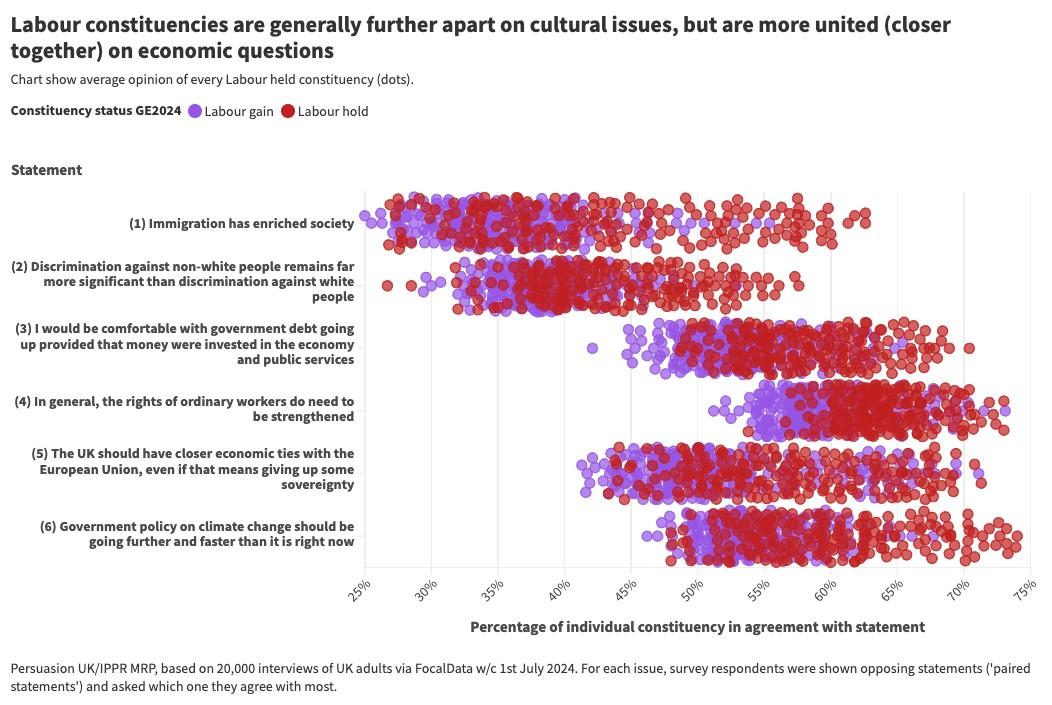


● 96% of constituencies in the UK have a majority or plurality of voters who say “I WOULD be comfortable with government debt going up provided that money were invested in the economy and public services”
● Just 4% of constituencies opt for the opposite view “I would not be comfortable with government debt going up, regardless of where the money was spent”
● 99% of Labour constituencies - and 98% of Labour gains in the general election - have a majority or plurality of people backing a pro-borrowing position.
● Looking at polling, a clear majority (64%) of crucial ‘Conservative to Labour’ switchers back the proborrow to invest position.

graph



● Every UK constituency has more people supportive of housebuilding than oppositional to it, even if it were built in their local area.
● On this issue, however, it is important to acknowledge that we sometimes see an ‘asymmetry of salience’. That is, the broad majority support or do not oppose development but are not moved to actively support it - while the small minority who oppose care sufficiently to organise against it through the planning system.
● 9 out of the top 20 most ‘NIMBY’ constituencies are held by Labour, having all been won at the 2024 election - but this view is still a minority view in those constituencies.
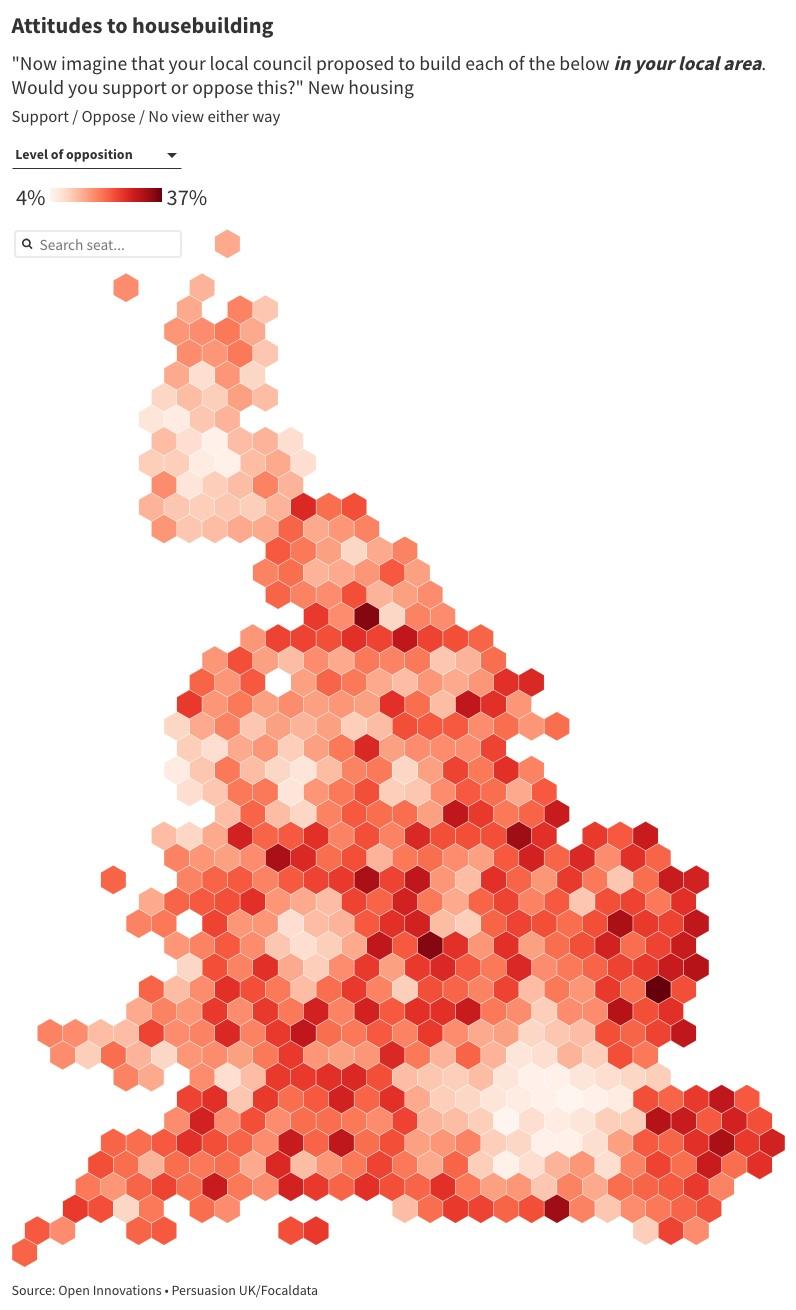
For an interactive map of where ‘NIMBYism’ is highest, click here.
● In addition, Labour voters are more prohousebuilding.



● All constituencies have a majority or plurality of voters in favour of onshore wind development even if it is being proposed for their local area.
● Of the top 20 areas with the highest levels of opposition to onshore wind development, only 1 is a Labour held seat.




● The view that “government policy on climate change should be going further and faster than it is right now” beats “government policy on climate change should be going slower than it is right now” in every constituency in the UK except two.
● The two exceptions are Clacton and Boston and Skegness, both held by Reform UK.
● Among seats Labour gained, 15 of the top 20 Net Zero seats are constituencies Labour win off the SNP. The others are ‘Blue Wall’ seats they won off the Conservatives in the South, such as Earley and Woodley, Watford and Chelsea and Fulham.
● 5 of the top 20 least pro Net Zero seats are held by Labour, although these still have more people wanting the government to go faster further than slower.




● Every constituency in the UK has a majority or plurality of people who believe workers rights should be strengthened. Constituencies differ only by the strength of this feeling.
● Seats that Labour won from the SNP feature disproportionately in top 20 most pro-worker constituencies in the UK.
● Of the top 20 least pro workers rights constituencies, 19 are not held by the Labour party.
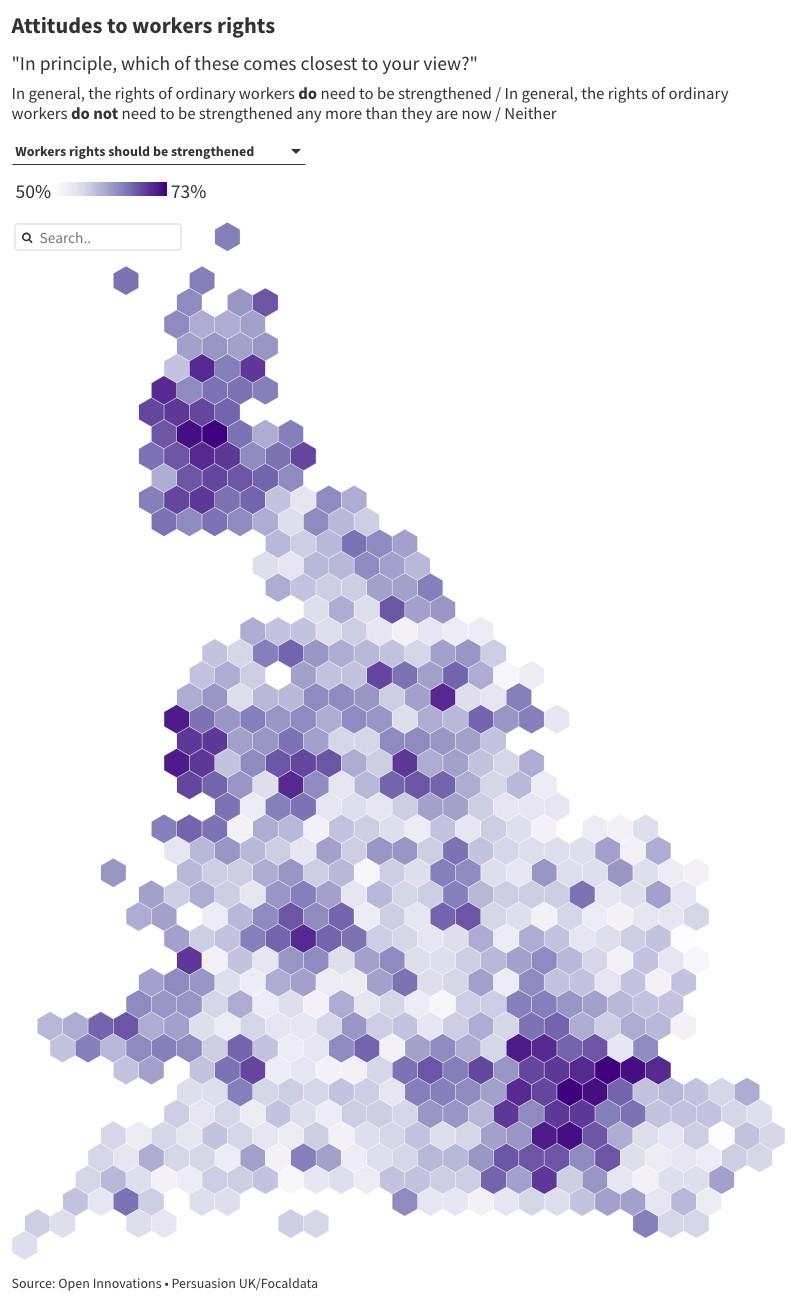



● 79% of constituencies have a majority or plurality of voters backing the statement “The UK SHOULD have closer economic ties with the European Union, even if that means giving up some sovereignty”.
● 21% of constituencies instead hold the plurality or majority view, “The UK should NOT have closer economic ties with the European Union if it involves giving up sovereignty, even if that involves some economic cost to the UK”
● 84% of Labour constituencies back closer economic ties with the EU, even at the cost of sovereignty. 76% of seats Labour gained in the 2024 election hold this view, too.
● In polling we can see this view is also strongly backed by Labour voters, too - including Conservative to Labour switchers.
Interactive map


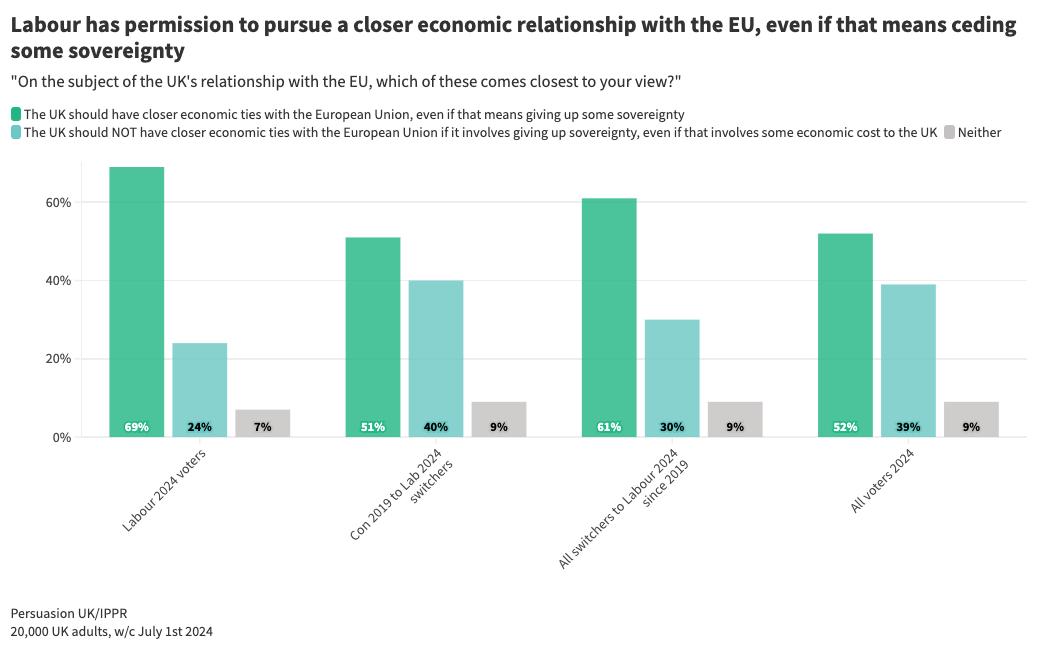

Opinion is more divided on people’s willingness to pay more tax
● The issue of tax somewhat divides the UK. 33% of constituencies have a plurality or majority of people saying they would pay more tax to fund public services. 67% of seats hold the contrary view, although it’s very close in a lot of constituencies.
● 40% of Labour held seats have a plurality or majority of people willing to pay more tax for public services.
● A majority of constituencies in Scotland have more people willing to pay more tax for public services than not.
● Labour voters - including switchers to Labour from the Conservatives - are more disposed to paying extra tax for public service investment than the population at large, although the consensus on this is not clear (see next slide).

Interactive chart



● 21% of constituencies have a majority or plurality view for ‘Immigration has enriched society’, with 79% seeing the opposite view predominante. That figure is 24% among Labour held seats.
● However, Labour voters in general within these constituencies incline to a pro-immigration view, though switchers from the Conservatives are more divided (see next slide).
● It is important to note that - as on any other issues - no one question can do justice to the complexity of opinion on a subject like immigration. This is just one indicator and opinion can move.
● Despite that caveat, it is clear that as a starting point, Labour’s coalition is a less united on this issue than other issues.


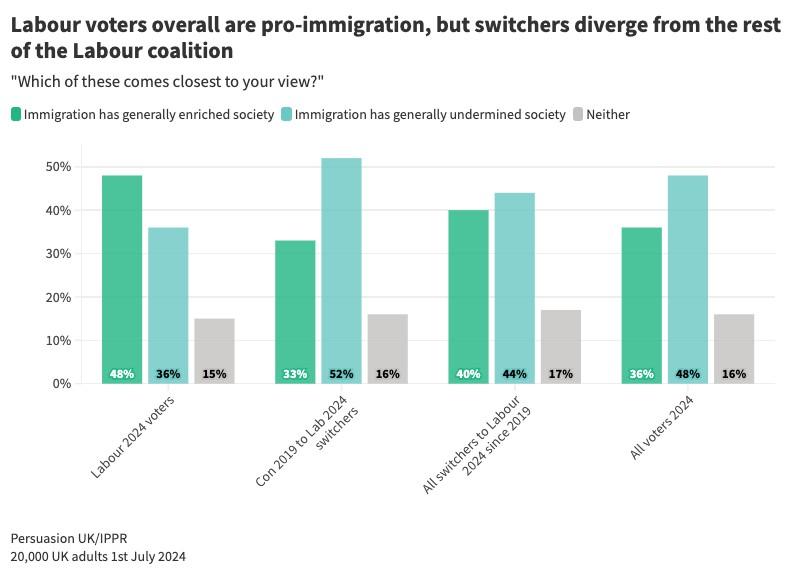

● In 76% of constituencies, there is a plurality or majority for the view that ‘discrimination against white people has become as big a problem as discrimination against non-white people’. 24% of constituencies see a majority for the opposite view, with this rising to 28% for Labour seats.
● Again, however, we see that Labour voters within these seats take a slightly different viewalbeit switchers from the Conservatives are again more divided on this question.




● 89% of constituencies have a majority or plurality of people who believe the welfare system has become too generous. This falls to 84% of Labour constituencies but remains a clear majority of those seats.
● Seats that Labour won from the SNP are disproportionately likely to hold the view that welfare benefits should be more generous.
● Labour voters are more likely to be of the view that the welfare system has become too ungenerous in recent years.
